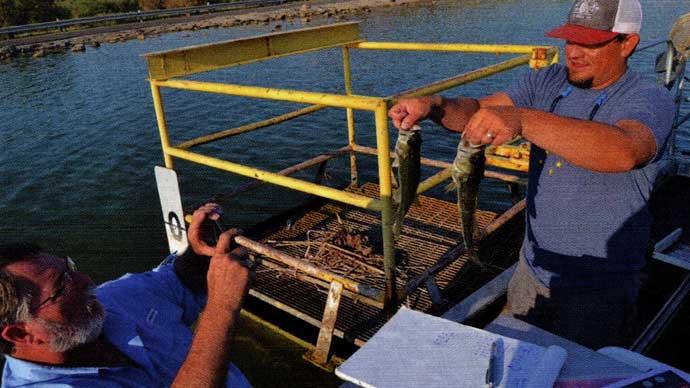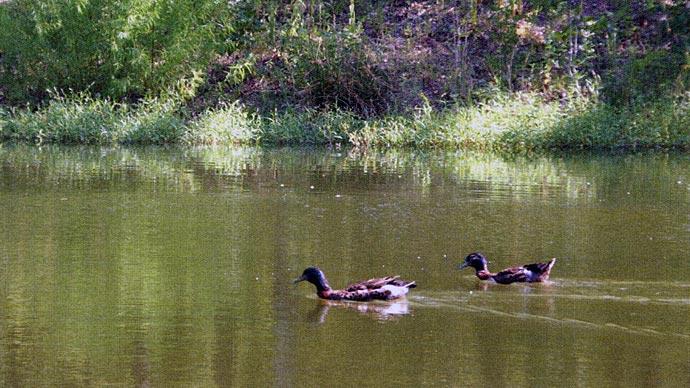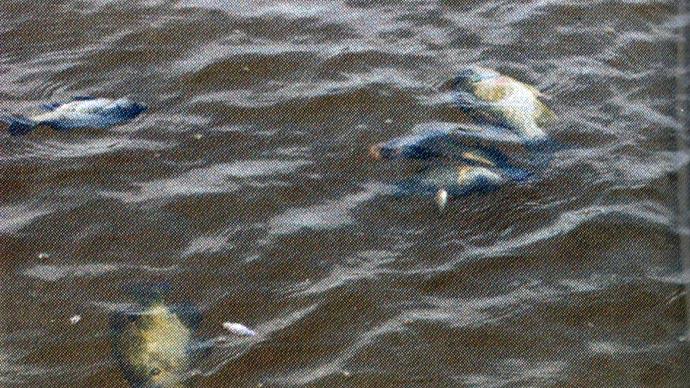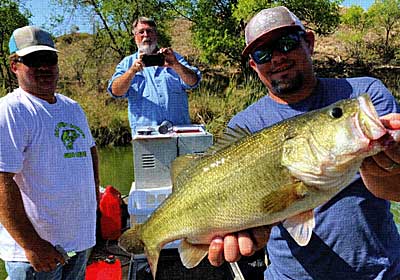
Ransom Canyon, Texas - False. The 97-acre residential lake is not in the big middle of nowhere. And, though you might see it from here, this is not the end of the earth.
Never mind that local residents say they can stand in the bed of a pickup, and see Fort Worth. Bogus claim. What is true at Ransom Canyon Lake, and most everywhere in North America, good fishing adds to the quality of life and adds to property values.
Ummm, but for that, you might look elsewhere.
Right here, right now, fishing for bass, stripers, crappie, catfish or even bluegill is sub-par. It's lousy. And the Pond Boss, Bob Lusk, knows why.
This aging lake has filled with silt and sand and nutrients, Lusk says, to the point natural fish habitat has been smothered. With no place to spawn and rear their young, predator species - largemouth, catfish and/or hybrid stripers - cannot keep up with the less desirable species.
At scenic Ransom Canyon, where the living is easy but the fishing ain't, you can catch your limit of fresh air, all right. Just don't expect much protein to put with those hush puppies.
A skilled bass angler, with good tackle and the latest in fishfinding electronics, can fish for hours, maybe days, without getting a strike. If Lubbock-area fishermen want to catch a fish, they travel an hour southeast, to Lake Alan Henry. Or take up tennis.
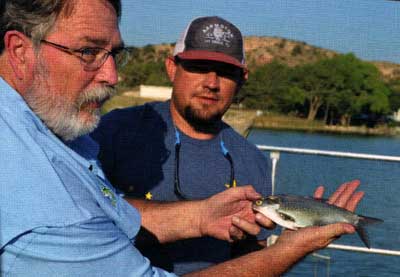
Blame it on eutrophication. Raise your hand if you remember the term from Part 1. Move to the head of the class if you remember "trash fish"—gizzard shad and common carp—have overrun the joint and crowded out the gamefish.
Members of the Ransom Canyon Habitat Conservation group, eager to improve fishing, have three basic options. In no particular order, they are: (1.) totally renovate the habitat, (2.) alter the fish population, (3.) do nothing.
For each, there will be a procedure, a process, along ramifications. At every turn, there will be a cost vs. benefit.
Professor Pond Boss puts it this way: "We want to un-pickle the pickle," Lusk says. "Okay, so how do we do it?"
Solutions cover the gamut.
(3.) Doing nothing brings equal results.
By that, Lusk means zero. It means lakeside residents must continue to live with what they've got - a scenic lake in a vast, flat sea of sand and wind. Catch a bass here, and locals will throw you a parade. You might need to hire a press agent.
"The lake is on its fisheries death bed and will continue to die," Lusk says, then tries to go upbeat. "But, hey, doing nothing won't cost any money or require any manpower.
(2.) Altering a fish population can be tricky. Ask any pondmeister, from coast to coast, who has tried it.
Predator fish can be stocked in high numbers (how high?). Reach for your wallet. Meanwhile, the carp and shad populations must be reduced.
Running gill nets and conducting tournaments will remove carp and shad, no doubt. But taking this route, the committee will need money and manpower...cash for stocking enough adult bass to make a difference- plus people to run the events...plus a place to dispose of the unwanted shad and carp. All those plusses add up to a net negative. Toss in the fact habitat is perfect for those species and harvesting lots of fish only makes room for more to reproduce and fill the niche, unless they can harvest enough and then money-whip the lake into submission with game fish and bluegills.
(1.) Totally alter the lake = drain it, and start over. Break out the checkbook. In a land that receives an average of 19 inches of rain a year, human nature must walk hand-in-hand with Mother Nature. This exercise will require patience and money.
Draining the lake and installing man-made habitat and refilling the basin will improve the fishing. If you can avoid a street riot. The work will require heavy equipment, working long hours in the lake bottom. Any spoil that comes out must go somewhere. Displacing dirt costs money. The farther you move it, the more it costs.
Then there's the habitat element. The lake will need to be converted from a carp and shad factory into a bass and bluegill magnet.
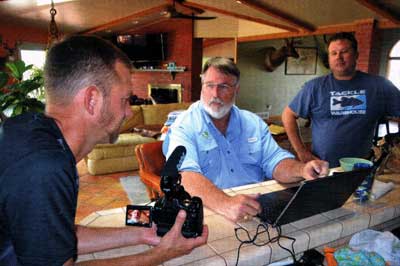
Good fishing adds to the joy of life. Catching 5-pound bass will boost local property values. And with it, property taxes. Some lakeside residents may get squeezed out. The first mention of draining the lake will bring out the lawyers. Pitchforks and Bowie knives come next.
In his decades of field work, Lusk, fisheries biologist and referee, has seen all this before. "If you drain the lake and rework the habitat, how will that impact the hydrology of the water-flow?" he says. "Buffalo Springs Lake (public reservoir) is just upstream from
Ransom Canyon. When Buffalo Springs overflows, Ransom Canyon must capture the runoff. That surplus water must be released, without property damage."
Before the next step is taken, the lake committee must fully analyze the demands on money and manpower, both finite in supply. Lusk foresees a scenario in which Ransom Canyon lies barren in the sun, for months on end. Patience will be in high demand.
Example: The summer morning Lusk conducted an electro-shocking survey to sample Ransom Canyon's fish population; several lake residents came out on their docks with questions. Suspicious, they wanted to know what the crew was doing. One elderly woman, shouting and waving her arms, shooed Lusk away.
How do you get several hundred residents to agree on anything? Maybe you don't, maybe you do. The lake committee is about to find out.
This we know for sure: "All politics are local."
Next: Lake committee members are spending the winter wrestling with their challenges. What will they do?
Reprinted with permission from Pond Boss Magazine

